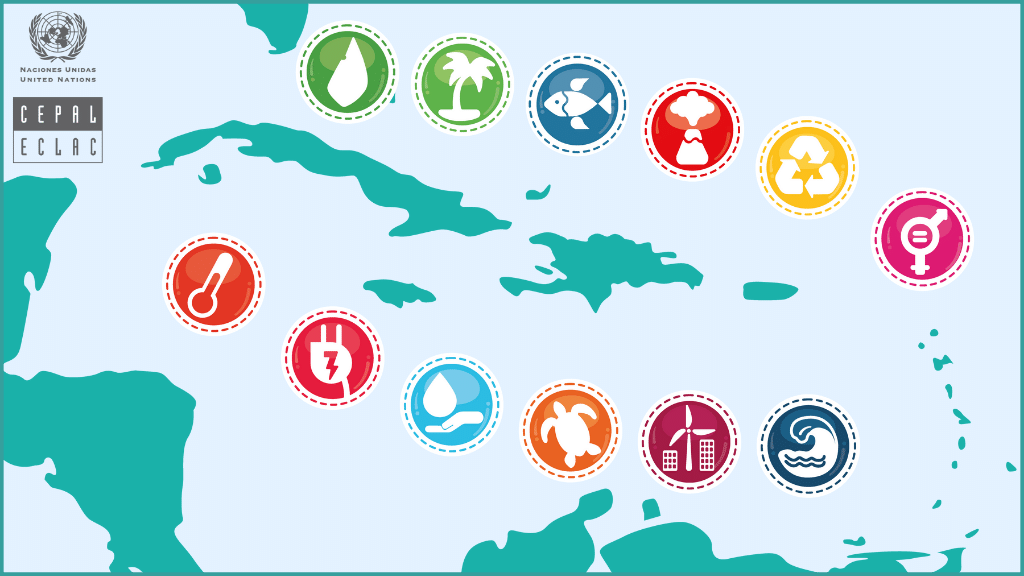Antigua and Barbuda: National workshop on generating climate change and disasters indicators for policy decision-making
Work area(s)
Teaser
Organized by Economic Commission for Latin America and the Caribbean (ECLAC), Department of the Environment, Ministry of Health, Wellness & The Environment and Statistic Division of Antigua and Barbuda (Ministry of Finance and Corporate Governance) in the framework of the Development Account 12 project.
Event information

Date
3 - 07 Dec 2021, 06:00 - 08:30Event type
Participation
The Caribbean region is acutely threatened by climate change, particularly the Small Island Developing States (SIDS). Antigua and Barbuda is no exception. The country is highly vulnerable to climate change and its associated impacts, including extreme weather events, more frequent and severe tropical cyclones, sea level rise, increasing temperatures and changing precipitation patterns. The effects of climate change have evidenced most recently by the impacts of Hurricane Irma in 2017 and other excess rainfall events.
Availability of quality statistics and indicators are crucial to effectively respond to the effects of climate change and build resilience. In this regard, Antigua and Barbuda has put in place a National Environmental Data and Information System (NEIS)2 and it strives to improve collection of environmental data. However, like other Caribbean SIDS, Antigua and Barbuda faces statistical and institutional challenges. Decision-making suffers from poor data analysis and decentralization of environment data production renders difficult coordination among various data producers leading to an underuse of existing data and duplication of efforts 3.
Against this backdrop, the ECLAC´s Statistics Division and Subregional Office for the Caribbean, in collaboration with the Sustainable Development and Human Settlements Division, are joining forces to enhance the production and use of key indicators and metrics to monitor and adapt to the effects of climate change and strengthen Environmental Information Systems (EIS). These efforts, supported by the Development Account of the United Nations, aim to boost the environmental pillar of the 2030 Agenda and improve policy coherence in the implementation of the Escazú Agreement, the Revised St. George´s Declaration (SGD 2040), the SAMOA Pathway, the Paris Agreement, and the Sendai Framework.
Objectives
- Train the participants to build selected environment, climate change and disaster indicators and its metadata.
- Identify data and capacity gaps to build an information platform on resilience for the country.
- Have a better understanding of how geospatial data can enhance the use of environment, climate change and disaster indicators for effective decision making
Programme of work
1. Inaugural session and introduction to the workshop
» Moderator: Karina Cázarez, Statistics Division of ECLAC
▪ Helena Jeffery Brown, Technical Consultant and representative of the Director of the Department of the Environment, Ministry of Health, Wellness & The EnvironmentStatchel
▪ Edwards, Chief Statistician of the Statistic Division of Antigua and Barbuda, Ministry of Finance and Corporate Governance & Public Private Partnerships
▪ Barbara Adams, Deputy Program Manager, CARICOM Secretariat
▪ Chamberlain Emmanuel, Head of Environmental Sustainability Division, OECS
▪ Reena Shah, Chief of Environment Statistics Section, UNSD
▪ Rolando Ocampo, Director of Statistics Division, ECLAC
Presentation(s)
Presentations of the participants
Introduction and objectives of the workshop
2. Environment, climate change and disasters indicators for Antigua & Barbuda: Needs and priorities
Presentation(s)
National policies and plans where climate change and disaster statistics and indicators are required
Global Set of Climate Change Statistics and Indicators: a tool to identify multi-purpose indicators on climate change
Climate Change Statistics and Indicators in the Caribbean
The Escazú Agreement: supporting environmental data for evidence-based public policies
3. What is needed to produce climate change and disaster statistics and indicators?
Presentation(s)
Framework for the Development of Environment Statistics (FDES)
Stages of statistical processing and statistical classifications and typologies
The geospatial dimension of environment, climate change and disaster statistics and indicators
Types of data sources used in Antigua and Barbuda: strengths and weaknesses
» Questions and Answers Session
» Conclusion of the day and what to expect for day 2
4. Recap from day 1 and introduction to day 2
» Moderator: Alda Díaz, Statistics Division of ECLAC
Presentation(s)
4.1 What are the most relevant climate change and disasters indicators for Antigua and Barbuda? Results from homework exercise
5. How to produce environment, climate change and disasters indicators?
Presentation(s)
From data to climate change and disasters indicators
ECLAC methodology to produce environment, climate change and disasters indicators
» Questions and Answers Session
6. Building selected environment climate change and disasters indicators with national data (Part I)
Presentation(s)
Instructions for break out groups exercise
1) Break out groups: building selected climate change and disasters indicators
2) Insights from the groups and Questions and Answers Session
▪ Conclusion of the day & what to expect for day 3
7. Recap from day 2 and introduction to day 3
» Moderator: Teshia Jn Baptiste, Statistics Division of ECLAC
Presentation(s)
Interactive quiz on Methodological Sheet (Slido)
8. Methodological Sheets for climate change and disasters indicators
Presentation(s)
How to develop a methodological sheet and examples of methodological sheets from other countries
» Questions and Answers Session
9. Building selected indicators with national data (Part II)
Presentation(s)
Instructions for break out groups exercise
Break out groups: filling the methodological sheet of the selected indicators
Reporting back and Questions and Answers Session
Evaluation of the workshop
Closing remarks